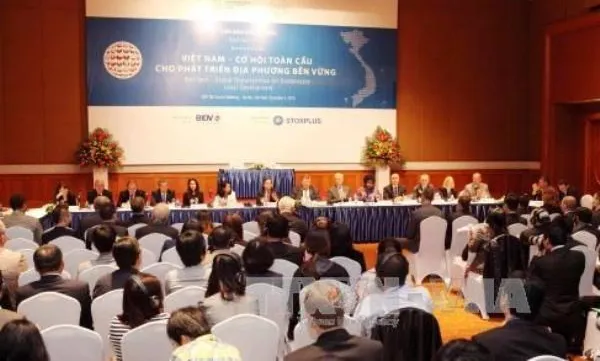International Investment Bank opens council meeting in Hanoi

The International Investment Bank (IIB), a multilateral development institution set up in 1970 by an intergovernmental agreement, re-launched in 2012 and currently bringing together nine highly diverse countries from Asia, Europe and Americas, including Viet Nam, has undergone a fundamental reform in the past three years, which spurred its dynamic growth.
Since then, the IIB has more than doubled its assets to over EUR 850 million, committing well above EUR 400 million to new investments, including in countries where it has been long absent such as in Viet Nam, often with other development institutions – the IFC, the FMO and the EBRD. These investments have been fuelled by IIB’s activities on debt capital markets, supported by its credit ratings of Baa1 (Moody’s), BBB- (Fitch) and A received from the Chinese agency Dagong in order to engage more closely with Asian investors.
As part of the Year of Asia announced at the IIB in the beginning of 2015, the Bank has been expanding its network of partners in the region and decided to hold the meetings of its highest governing body, the IIB Council, this year in Asia, in Ulaanbaatar and Ha Noi. Asia has been an important focus of the IIB – the Bank became an observer with the ADB and started reaching out to other development institutions as the member of the Association of Development Financing Institutions in Asia and the Pacific (ADFIAP). High level delegations of IIB’s shareholders – Bulgaria, Czech Republic, Cuba, Hungary, Mongolia, Romania, Russia, Slovakia and Vietnam – meet twice a year during the Council Meetings in order to decide on the most important management issues and to set IIB’s strategic course. Viet Nam’s membership in the IIB is managed by the State Bank of Viet Nam, with Governor Nguyen Van Binh as the head of the country’s delegation.
The IIB is unique among other such institutions by its member state composition – for example, it is the only development bank in the world with Cuba as a member. The greatest testimony to the progress the IIB has made since 2012 can be seen in Hungary’s decision to return to the Bank and become once again its full member in May this year. As a dynamically growing institution, the IIB is open for other countries to join.
Overall, during the 45 years of its existence the IIB invested almost EUR 8 billion despite low activity in the 90s and 00s caused by the circumstances of the era. IIB’s mission is to support economic development of its member states and cooperation between them – in reality this translates into intermediated lending through selected local banks to enhance access of SMEs to financing, as well as direct project financing in the energy, transport, manufacturing and other sectors. In the beginning of 2015, the Bank also launched its now highly popular trade finance product to additionally support trade operations of its member states. The IIB currently focuses on medium-sized projects of at least EUR 10 million and more (though it can consider lower amounts) and one of its long-term goals is to return to financing of large scale infrastructure investments.
The agenda of the 104th IIB Council Meeting will include additional internal changes of the Bank in order to enhance its capacity as a multilateral development institution as well as discussion on the strategic course of the IIB. The Meeting will be followed by the Business Forum “Viet Nam – Global Opportunities for Sustainable Local Development”, focusing on support for SMEs and regional development in the country. The event will begin with the annual Open Session of the IIB Council, attended by IIB’s key partners – most importantly, other international financial institutions. The Business Forum is expected to attract representatives of governments, banks and businesses from Viet Nam as well as other IIB member states. The aim of the event is to examine challenges and opportunities in relation to the two main thematic areas as well as to provide a venue for meeting each other, identifying business opportunities and setting up partnerships.
The venue of the 104th IIB Council Meeting, Ha Noi, also reflects the active and important role Viet Nam has been playing at the Bank, especially since its re-launch. Among other things, the country increased its share in IIB’s capital from around 0.4% to over 1.2% and the IIB has appointed a local representative to support the expansion of its activities in the country, making it the only such local presence of the Bank outside its headquarters in Russia and its newly established European Regional Office in Slovakia. Though Viet Nam’s share is relatively small, the country has an equal say in the decisions of the Council – each shareholder has one vote irrespectively of the size of its share. Viet Nam is also represented in IIB’s Board, which manages the Bank’s day-to-day operations. This only further underlines the important role of Viet Nam in the IIB.
Thus, the 104th IIB Council Meeting and the following Business Forum promise to become an important event in Ha Noi of 2015, potentially leading to many more investments in Viet Nam for the months and years to come.
Tags:





